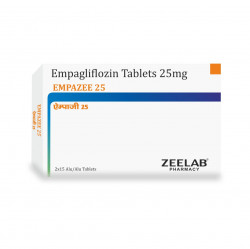Empagliflozin
Empagliflozin is a medication primarily used to manage type 2 diabetes and heart failure. It works by helping the kidneys remove excess glucose from the bloodstream through urine, effectively lowering blood sugar levels. Additionally, Empagliflozin has been shown to improve heart health by reducing the risk of cardiovascular events in individuals with diabetes. It is commonly prescribed alongside diet and exercise to achieve better glycemic control and to reduce the risk of heart failure complications.
Uses of Empagliflozin
- Managing blood sugar levels in type 2 diabetes
- Reducing the risk of heart failure-related complications
- Improving cardiovascular health in diabetic patients
- Helping reduce the risk of hospitalization due to heart failure
How Empagliflozin Works
Empagliflozin works by inhibiting sodium-glucose co-transporter 2 (SGLT2), a protein in the kidneys responsible for reabsorbing glucose into the bloodstream. By blocking this protein, it allows excess glucose to be excreted in the urine, lowering blood sugar levels. Additionally, it helps to reduce fluid overload, which is beneficial for heart failure patients.
Benefits of Empagliflozin
- Helps control blood sugar levels in type 2 diabetes
- Reduces the risk of cardiovascular events in diabetic patients
- Decreases the risk of hospitalization due to heart failure
- Supports kidney health by lowering blood sugar levels
- Has a mild diuretic effect, helping to reduce fluid retention
How to Take Empagliflozin
Empagliflozin is typically taken once a day, with or without food. It’s important to follow the prescribed dosage from your doctor. It’s often taken in the morning to avoid interfering with sleep. Make sure to drink plenty of fluids while on this medication to stay hydrated, as it can cause increased urination.
Type of Dosage Available
Side Effects of Empagliflozin
- Frequent urination
- Dehydration and dizziness
- Urinary tract infections
- Increased risk of ketoacidosis (rare)
- Low blood pressure (hypotension)
- Kidney problems (in rare cases)
Safety Advice
- Monitor blood pressure regularly, especially if you are on blood pressure medication
- Consult your doctor before using if you have a history of kidney problems
- Stay hydrated and avoid dehydration by drinking enough fluids
- Not recommended during pregnancy or breastfeeding unless advised by your doctor
- Inform your healthcare provider if you are taking medications for diabetes or heart failure
Frequently Asked Questions (FAQs)
Q: What is Empagliflozin used for?
A: Empagliflozin is used to control blood sugar levels in type 2 diabetes and reduce the risk of heart failure complications in diabetic patients.
Q: Can I take Empagliflozin if I have kidney problems?
A: You should consult your doctor before taking Empagliflozin if you have kidney problems, as it may affect kidney function in some cases.
Q: Does Empagliflozin cause weight loss?
A: Some patients may experience modest weight loss due to the increased excretion of glucose through urine. However, this is not the primary purpose of the medication.
Q: Can I drink alcohol while taking Empagliflozin?
A: It’s advisable to limit alcohol intake, as it can increase the risk of low blood sugar and dehydration while taking Empagliflozin.
Q: How often should I take Empagliflozin?
A: Empagliflozin is typically taken once a day, but your doctor will determine the exact dosage based on your health condition.
Related Salt
Download India's most affordable pharmacy app
- Compare with medicine prices
- Save upto 90% on your medicine bills

Temperature Controlled storage and delivery

Regular Sanitization

Disinfected Packaging
















 Added!
Added!